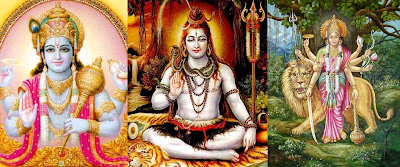Response to a question: In one of your lectures, you have said that there are 3 main forms of the Almighty - Vishnu, Shiva, and Durga. Isn't the third main form of the Almighty Brahma? I thought Durga was a part of Shivji. Can you kindly clarify my confusion?
This is a very good question and a common misconception. Brahma is actually a celestial god (note that it is written with a small or lower case 'g'). He is a devta, not bhagwan. Devtas or celestial gods are under maya, which means their abode is temporary and is destroyed when the universe is dissolved. Supreme God (big or upper case 'G') or Bhagwan's abode is beyond maya, Divine and eternal, so it is not affected by the dissolution of the universe. If somone worships a celestial god (like Brahma, Indra, Vayu, Agni, Varun, Kuber, etc.), they go to the abode of that celestial god. But they don't stay forever. They return to this world and take birth again. If someone worships any form of supreme God (like Krishn, Ram, Vishnu, Shiv, Durga, Ganesh, Kartikeya, Kali, Gauri, Amba, Lakchmi, Saraswati, Parvati, Hanuman, etc.) then they go to the supreme Divine abode of God which is beyond maya and they stay there forever, never to be reborn in this world under the bondage of maya.
To address your questions directly, yes Shiv and Durga (or Parvati) are one. Durga is shakti and Shiv is shaktiman (the base in which the power resides). The three main almighty forms of God are Vishnu, Shiv and Durga, because all the other almighty forms are affiliated to them. Lakchmi and Saraswati are affiliated to Vishnu; Ganesh, Kartikeya and Hanuman are affiliated to Shiv; and Kali, Gauri, Amba, etc. are affiliated forms of Durga. So all those forms are Divine and almighty, but Vishnu, Shiv and Durga are considered main. Beyond the almighty forms of God (and including Them and all Their powers) are the loving forms of God Krishn and Ram (which included Radha and Sita).
Where does Brahma come in and why do we talk about Vishnu, Shiv and Brahma? In the creation of the universe, Krishn's almighty power, Maha Vishnu of Vaikunth abode, creates the whole universe and becomes omnipresent in it. The universe is endless. In the endless universe, uncountable number of planetary systems, or brahmandas are created (a brahmand includes an earth planet with its sun and other planets, and a corresponding swarg (celestial abode) and narak (hellish abode). In every one of those brahmandas, God Vishnu and God Shiv take avatar in order to manage the affairs of that planetary system. In every brahmand there is also a Brahma who is assigned to be the creator of that brahmand. He creates with the power given to him by supreme God. Vishnu maintains the brahmand and Shiv destroys it in the end. These are the three governors of a brahmand. Both Vishnu and Shiv are avatars of God from the Divine world. Their abodes in this brahmand are also Divine, like embassies of the Divine abode, here in the material plane. Brahma's abode is the topmost celestial abode, and Brahma himself is not a form of supreme God, he is a celestial god.
To review, Brahma is one of the three governors of a brahmand, along with Vishnu and Shiv. However, Vishnu and Shiv are forms of supreme Divine God, and Brahma is a celestial god.
Swami Nikhilanand, JKP Radha Madhav Dham. © 2011. All rights reserved.
Swami Nikhilanand, JKP Radha Madhav Dham. © 2011. All rights reserved.

